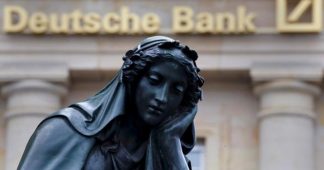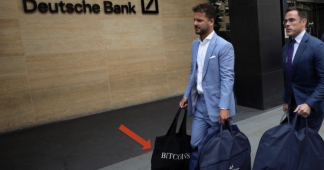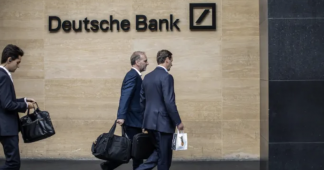The Deutsche Bank Downfall
How a Pillar of German Banking Lost Its Way
For most of its 146 years, Deutsche Bank was the embodiment of German values: reliable and safe. Now, the once-proud institution is facing the abyss. SPIEGEL tells the story of how Deutsche’s 1990s rush to join the world banking elite paved the way for its own downfall.
By Ullrich Fichtner, Hauke Goos and Martin Hesse
Greed, provincialism, cowardice, unfocused aggression, mania, egoism, immaturity, mendacity, incompetence, weakness, pride, blundering, decadence, arrogance, a need for admiration, naiveté: If you are looking for words that explain the fall of Deutsche Bank, you can choose freely and justifiably from among the above list.
The bank, 146 years after its founding, has become the target for all manner of pejoratives, and not just from outside observers. All of the above terms were used in interviews held during months of reporting into the causes of the downfall of Germany’s largest financial institution. They popped up over the course of several hours of interviews with four Deutsche Bank CEOs, three former and one current. And they were uttered in interviews with eight additional senior bank managers and board members conducted over the course of several years, from the 1990s until today, and in meetings with captains of industry who know the bank well and during encounters with major stakeholders. More than anything, the disparaging words come up frequently in interviews with those who have worked or still work at the bank as customer service advisors, as branch managers or in positions lower down on the food chain.
What we have found in the course of these myriad interviews — combined with the hours spent analyzing bank balance sheets, thousands of pages of files, committee meeting minutes and archive material — is that the collapse of Deutsche Bank is the result of years, decades, of failed leadership, culminating in the complete loss of control of the company by top managers during the period between 1994 and 2012.
It is a story about how Hilmar Kopper, Rolf E. Breuer and Josef Ackermann, the leaders of Deutsche Bank during those fateful years, essentially turned over the bank to a hastily assembled group of Anglo-American investment bankers before Anshu Jain, the prince of these traders, rose to the top and spent three more years sailing the bank full-speed-ahead into the shoals.
It is also a story of how these bank heads, along with numerous other members of the management and supervisory boards, stood aside as Jain and the many other new investment banking heroes modified the staid German financial institution to serve their own purposes — essentially looting it and robbing it of its very soul — without leaving behind a better, stronger bank.
The subject is vast and convoluted, given the many aspects and paradoxes that come with the decline of such a large financial institution. One of those is the fact that, even as Deutsche Bank is rapidly losing value, it is still seen today as the largest systemic risk for the global finance world. Every detail in the sequence of its decline is controversial, partially because the financial world still considers it normal that nobody take responsibility for anything but themselves. All of them are most concerned with painting their own role in the best light possible and presenting the decisions they made as the only ones possible at the time.
Read more at https://www.spiegel.de/international/business/the-story-of-the-self-destruction-of-deutsche-bank-a-1118157.html










